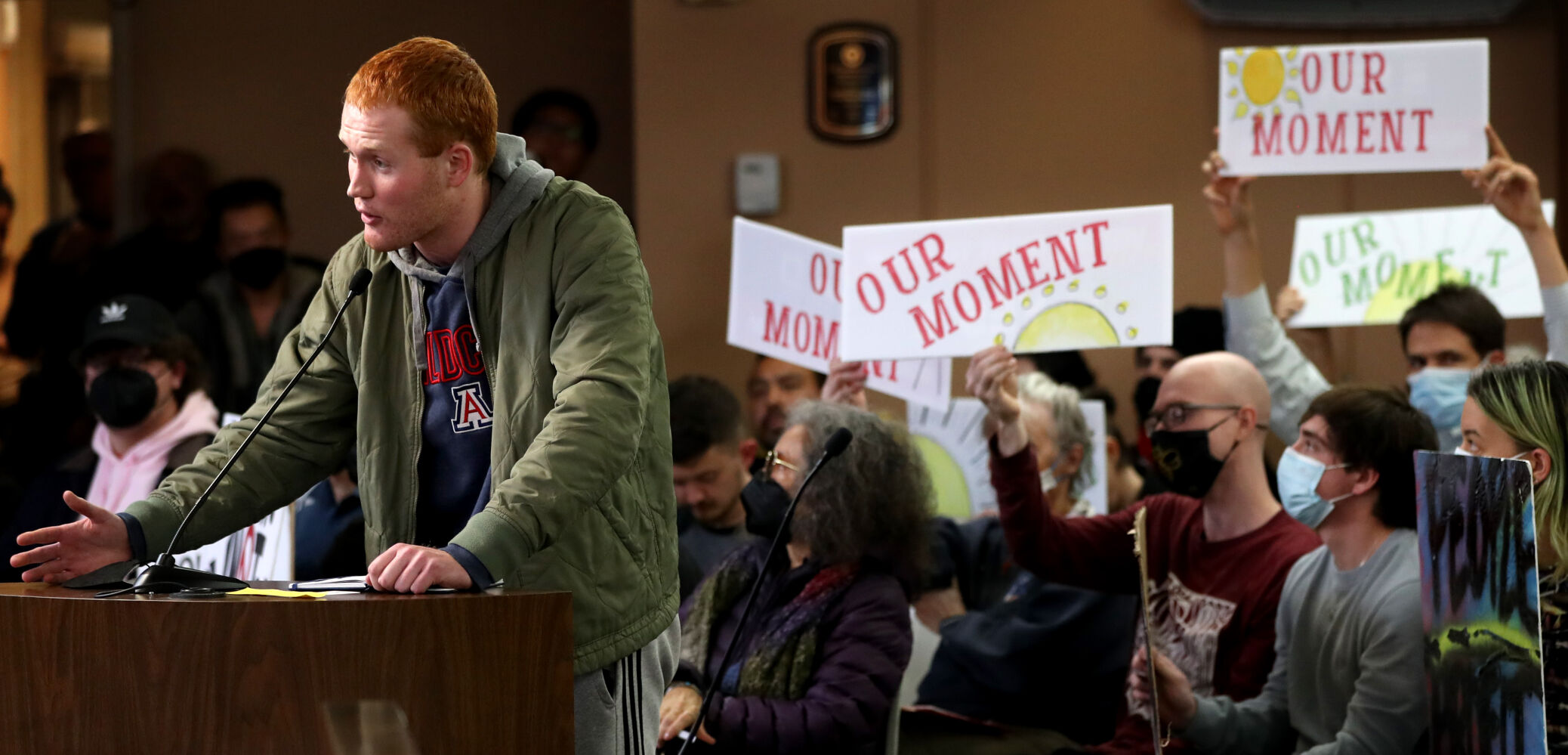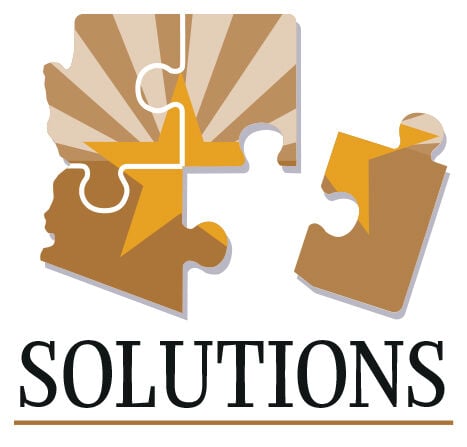Dozens of Tucson teenagers are advocating for climate justice across the state and making sure their voices are part of important community conversations.
The Arizona Youth Climate Coalition got its start in 2019 as part of the nationwide Youth Climate Strike, inspired by Swedish student Greta Thunberg, who staged a protest outside of the Swedish parliament the year in August 2018.
Young people across the globe took Thunberg’s lead and on March 15, 2019, launched a worldwide strike that included more than 1 million people protesting during 2,200 events in 125 countries.
A second strike took place on May 24, 2019 — timed to coincide with the European Parliament election — with 1,600 protests across 150 countries drawing hundreds of thousands of participants.

Young people in Arizona organized and joined onto the Youth Climate Strike movement, but after the events, broke off and formed the AZ Youth Climate Coalition. With teams located in municipalities across the state, the individual groups advocate for local and statewide action to protect the climate.
Tucson team biggest in state
In Tucson, AZYCC members have been regular attendees at city council meetings, most recently to speak in opposition of a proposed franchise agreement with Tucson Electric Power. If approved by voters in May, the agreement would allow TEP to fund the undergrounding of future utility line projects. The group and other local climate organizations have concerns that TEP is trying to fast track the agreement and pass it well in advance of the current agreement’s 2026 expiration.
Tucson Mayor Regina Romero said TEP’s CEO has assured her that the company will work on an agreement that will take the city to 100% renewable energy as soon as possible, furthering the city’s goal of becoming carbon-neutral by 2030.
AZYCC’s Tucson team is the biggest in the state, with upwards of 40 members who regularly attend meetings and events. The group’s primary focus over the past year has been working with the city to get community input on its climate action and adaptation plan, but members are invited regularly to speak to the mayor and council about climate issues.
The city has recognized AZYCC as an official partner group, with representatives invited to attend community dialogues and meetings and share their input on Tucson’s climate future.
University of Arizona freshman Ojas Sanghi has been involved with the group since last summer. After participating in a mock election project earlier in the year at University High School, where climate action made up a large part of Sanghi’s party’s platform, he started looking at other ways to get involved.
“I was worried when I went to the first meeting. I wasn’t sure what the vibe was going to be, but everyone was having a good time and passionate about this,” Sanghi said. “As soon as I joined, I was given the opportunity to work on projects with everyone else.”
The group is also focused on environmental justice issues and frequently partners with other groups, including the Tucson Climate Coalition, to support their missions.
“We post about them on Instagram and try to generate publicity for them and give them attention, as well,” he said.
Sanghi said it’s nice to be working so closely with the city. In the fall, AZYCC members– including Sanghi– testified in support of an update to the city’s electric vehicle building code, which the mayor and council later voted to approve.
Sanghi is majoring in computer science and minoring in future earth resilience, a new minor at the UA. He’s also a member of UArizona Divest, a campus club working to convince the UA Foundation to complete a phased divestment from fossil fuels by 2029. The group is also hoping to get a public commitment from the foundation to make no further investments in the fossil fuel industry.
As of 2019, the foundation had $64 million invested in fossil fuels, according to the group.
“We had a rally on the mall last year that got a lot of attention publicly,” Sanghi said. “We’re in the trenches, working hard.”
While UArizona Divest is still growing its community, AZYCC has formed some significant alliances with local officials and state lawmakers. Last summer, Tucson City Councilman Kevin Dahl offered up his ward office as a meeting space for the group.
Sanghi is hoping that the group continues to grow, saying that the barrier to entry is very low.
“We’re not exclusive. Everyone should be able to partake in these kinds of things if they want,” he said. “If you’re interested in these topics and want to do something about them, you’re welcome.”
What's Working
Arizona program hopes to be nationwide model for healthy babies
‘Think globally and act locally’
Basis sophomore Tanish Doshi got involved with AZYCC last year by way of his school’s sustainability club, which at the time was run by AZYCC’s communications director.
“I wanted to do something bigger than the sustainability club,” Doshi said.
AZYCC fit the bill, with Doshi and others helping the Tucson Climate Coalition to organize a climate town hall during last year’s election cycle, with several statewide candidates in attendance.
“It showed me how accessible some of these people in power are,” Doshi said. “State policy makers do have time for constituents. If you have needs, they will address them.”
Doshi said the group has shown him that even if a person can’t vote, there are other ways to make a meaningful impact in the community.
“When we go to events, people are excited to see young people engaged in these topics,” he said. “Usually the reaction we get is first surprise, then we get a positive reception.”
Doshi has long been interested in the environment and public policy, but his passion for the topics have grown since moving to Arizona six years ago.
“We loved camping and hiking in Illinois, so when we moved here, that was a huge deal to us,” he said. “We backpacked the entire Grand Canyon and have taken lots of camping trips.”
As part of an Eagle Scout project, Doshi built a flood mitigation system for Habitat for Humanity, saying that he learned through the project how climate affects the community on a day-to-day basis.
“Even if buildings are up to code, they can’t deal with the unprecedented floods we’re seeing and volatility on the climate,” he said. “The ecosystems all tie together, so one system affects the others.”
Doshi is especially interested in flooding and rising temperatures and is hoping to pursue a career in environmental law.
“Climate change is a global issue that all people on the planet face. You have to think globally and act locally,” he said. “The best way to affect change is to start in your own community and find the problems that impact you and the people around you.”
Doshi said that if people in every town in the state lobbied their mayor and city council and school boards, it would create a much larger change than just going on Twitter and talking about policies.
“With climate issues, local and state legislatures have a disproportional impact on our lives than the president or congress, who don’t really have much of an impact,” Doshi said.
AZYCC is focusing its efforts on recruiting and organizing, and getting into a regular meeting schedule, with Doshi saying youth have very different schedules than adults.
“Regardless of your age, whether you’re 10 or 90, there’s a place for you as an activist and you can advocate for climate or any issues that matter to you,” he said. “If not AZYCC, there are other groups here in Tucson.”
‘No longer sticking our heads in the sand’
Basis sophomore Emilia Kim has been with AZYCC since 2021, but stepped into a larger role last year.
“We see people like Greta Thunberg who are making these big drastic changes and protesting,” she said. “For me and people my age, it was like, ‘Oh, that’s what protesting is. That’s what you need to do to fix climate change,’ but that’s not true.”
Through her involvement with AZYCC, Kim has learned that engaging in discussions with local officials, state lawmakers and even students is just as impactful, if not more.
“I’m mainly concerned about literacy when it comes to schools and this isssue,” Kim said. “We’re reaching out to schools to see if there’s any way we can help students become more governmentally literate and take action.”
Get a roundup of solutions reporting from the Arizona Daily Star at linktr.ee/starsolutions. Video by Caitlin Schmidt / Arizona Daily Star.
Bestselling author Seth Godin agrees that bringing young voices to the table is important when it comes to issues like climate change, which the younger generation will be left to deal with after current leaders are dead and gone.
Several years ago, Godin collaborated with more than volunteer contributors to create “The Carbon Almanac: It’s Not Too Late,” a collection of essays, graphs, cartoons, tables and resources that provides credible information on carbon and its impact on the climate, intended for everyday people.
“After 25 years of blogging and writing best-selling books, I didn’t know very much about the details of what was happening with our climate,” he said. “Because I didn’t feel confident, I was hesitant to talk about it.”
Godin and others compiled the book in just 165 days. It’s since become a worldwide best-seller and has amassed millions of fans, including Tucson City Councilman Dahl, who has been handing out copies of the book to climate change activists and members of the AZYCC.
The book has been developed into a photo book, podcast series and a children’s book, aimed at readers between the ages of 10 and 15. That version has been translated into dozens of languages and is used in schools in 100 countries around the world.
“The book by itself doesn’t change anything, but it starts conversations,” Godin said. “It took 100 years to make this mess and we only have 10 years to fix that. We’re no longer sticking our heads in the sand.”
Godin said it’s important to talk about these issues and to bring diverse voices into the conversation. He’s hoping his book will help people learn more about the situation and gain confidence to have those conversations.
“What young people in Arizona are showing us is that we don’t need everyone to do something, we just need someone to do something,” he said. “When we do it together, it multiples. If enough of us talk about it, small things change and then bigger things change.”
Affecting change at the local level is the key to solving this and other systemic issues, Godin said.
“It’s not going to happen because Congress is going to pass a law. They’ll do that last, not first,” he said. “It starts with meatless Monday in the school cafeteria and then you’ll see more and more and more.”
Fighting for the future
Arizona State Senator Priya Sundareshan also appreciates the work of the AZYCC and other youth-led climate groups.
“We will all leave this world and it will be all the young folks who continue to live in it and we want to make sure it’s inhabitable and sustainable for them,” she said. “When we think about the future and the world we’re leaving to our younger folks, that’s ultimately what drives anybody who’s trying to address climate change.”
Sundareshan said that young people today are aware of the big picture and are organizing to fight for the future they want, in part by reaching out to and supporting candidates with whose views they align, and helping those people get elected.
“Every generation has that spectrum of people who are highly engaged and people who still need the awareness,” she said. “We saw in the last election cycle that youth voter turnout has been on the increase, which is really great to see.”
Sundareshan has been interested in climate change and transitioning energy sources away from fossil fuels since she first learned about the situation in college. Now that she’s been elected to the state legislature, she said she plans to introduce a handful of bills that will support the transition from fossil fuels to renewable energy and other climate-related changes.
“As a new legislator, they say don’t introduce too many bills,” she said. “I’m flying in the face of that because I have so many environmental things I want to address.”
She’s also planning to bring back some of former State Senator Victoria Steele’s previous bills that weren’t passed and said she’s grateful that newly elected Governor Katie Hobbs has identified water as one of the areas to which she’ll focus resources and engage the community in discussions.
But to affect change, voter accessibility needs to improve, Sundareshan said.
“We want to make sure that youth voices, especially youth who care about climate issues, that they’re there at the table and their voices are heard,” she said. “But also other community members who don’t have the opportunity to have their voices heard.”
With roughly 40 new legislators elected during the last cycle, some new voices and ideas have already been brought into the conversation, which Sundareshan hopes provides the momentum necessary to get some of the climate-related bills across the finish line.
“I hope that we’re turning the tide and at the same time, we’re getting more engagement and in a better political space to get these ideas brought forward,” she said. “If not this year, then next year.”





